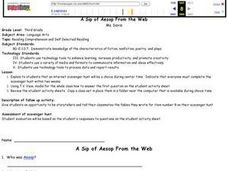Curated OER
Which Came First, the Chicken or the Egg?
In this worksheet, students answer questions regarding the function of an egg.
Curated OER
What's Hatching in Kindergarten?
Students identify oviparous animals. They brainstorm a list of animals that lay eggs, read "Chickens Aren't The Only Ones" by Ruth Heller and then add to the list. Students complete a booklet that shows an egg and an oviparous animal.
Curated OER
Life Cycle
For this science worksheet, 3rd graders will investigate the life cycle of butterflies, frogs and chickens who hatch from eggs by creating a wheel. Students cut and assemble this wheel with windows that can display the pictures of...
Curated OER
EGG-STRA, EGG-STRA LEARN ALL ABOUT IT
Young scholars explore how animals produce young by watching age-appropriate videos on the subject. They watch as chicken eggs either hatch or not in an incubator.
Curated OER
Embryo Development
Students observe the development of a chicken embryo. In this biology lesson plan, students compare and contrast the development of human and chick embryo. They make a chart and explain their findings to the class.
Curated OER
Get Cracking
Students compare the life cycle of an animal hatched from an egg with one born from its mother's womb. The lesson focuses on dinosaur eggs. They create dinosaur eggs from balloons and papier mache.
Curated OER
Are You Aware?
Bring the five senses to life with a fun science experiment! Kindergartners and first graders read an explanation of the five senses, then identify which items Sophia can sense if she is blindfolded. A science explanation at the bottom...
K12 Reader
Animal Proverbs and Adages
What will play when the cat's away? Practice figurative language with a list of proverbs about animals. Kids use the word bank at the top of the page to fill in the blanks based on their knowledge of common phrases.
August House
The Contest Between the Sun and the Wind
Learn the moral of the story with a series of activities about Aesop's fables. Focusing on The Contest Between the Sun and the Wind, learners complete a graphic organizer to discuss who, what, how, and why the events occur. Additionally,...
August House
The Hidden Feast
What is a proverb? This is the leading question of this resource. First, explore proverbs and their meanings. Then, read aloud The Hidden Feast: A Folktale from the American South by Martha Hamilton and Mitch Weiss and partake in a grand...
Curated OER
Easter Crossword Puzzle
In this Easter crossword puzzle, students find the answers to 14 questions. They fill the puzzle across and down with the answers.
Curated OER
Number Song
Students sing a song (to the tune of The Twelve Days of Christmas) that helps reinforce their counting skills.
Curated OER
Idiom Exercise
Don't let your pupils bite off more than they can chew! Comprehending idiomatic speech can be very perplexing to language learners. Readers must use context clues, common sense, and knowledge of the connotative and denotative meanings to...
Curated OER
Country Sayings Exercise
In this idioms worksheet, students read 12 country expressions or colloquial expressions and then match each with its correct meaning, Students then write down 3 colloquial expressions or idioms from their language and record the meanings.
Curated OER
Maxim Mix Up
In this language arts worksheet, students rewrite ten well saying into mixed up sentences. There are 9 mixed up sentences the students must decipher to get their other 9 well known saying. There is an answer key provided.
Curated OER
A Sip of Aesop From the Web
Third graders answer specific questions by conducting an Internet scavenger hunt. They write their own fable after reading many different fables on the Internet. They questions that they answer are included in this lesson.
Curated OER
The Princess Easter
In this holiday reading worksheet, students read a short story about the Easter holiday. Students then answer 5 questions about the story.
Curated OER
How Fragile Is an Egg?
Students design a "container" for his/her egg to determine whether the egg remain intact when dropped from a predetermined height.
Curated OER
Egg Toss
This cross curricular lesson plan involves eggs. Students read about eggs. A counting game involving an egg carton and ping pong balls (eggs) is played as students toss balls into numbered egg carton cups and adding their score. Students...
Curated OER
You Don't Say!!
Fourth graders write and respond to sayings throughout the school year. They define the idioms, illustrate them and compare their meanings with other groups in the class.
Curated OER
Animal Idioms
In this ESL animal idioms worksheet, students read 12 idioms that contain an animal name. Students draw a line to the meaning that will match each idiom its definition.
Curated OER
Total English Advanced: Animals and Their Environment Crossword!
In this key vocabulary crossword puzzle learning exercise, students practice key vocabulary as they read the 14 clues to correctly fill in the word puzzle.
Curated OER
Cultural Sayings - Idioms
In this grammar worksheet, students read the definition and an example of idioms or cultural sayings. They work on-line to match 14 idioms with their true meanings.
Curated OER
Do You Mean?
Students examine old sayings. In this interpretation activity, students read and interpret traditional sayings or proverbs. They discuss how these sayings can help improve their lives, behavior or how they treat others.
Other popular searches
- Hatching Chickens
- Hatching Chickens Activities
- Hatching Chickens Incubator
- Hatching Chickens Worksheets

























